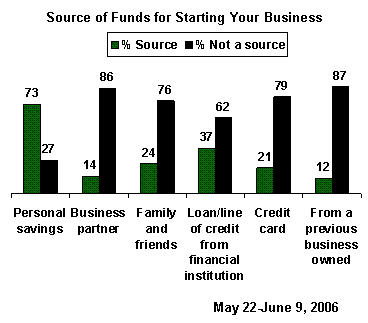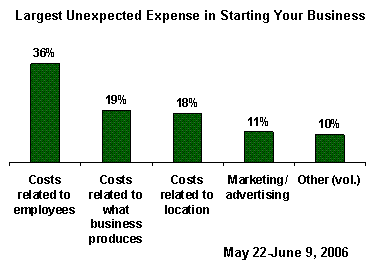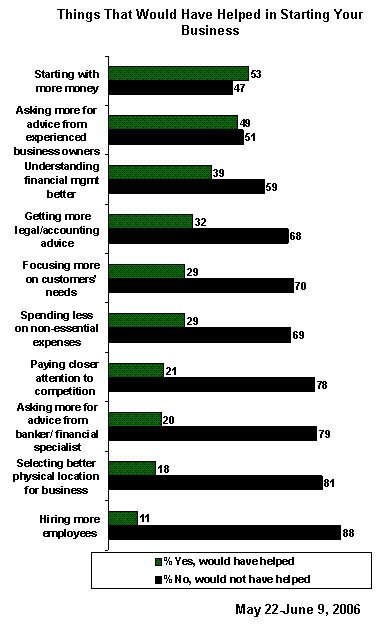GALLUP NEWS SERVICE
PRINCETON, NJ -- Starting a small business is extremely challenging. In fact, most efforts to do so fail within their first year. So, what are the keys to success? In order to get some insights into this question, the Wells Fargo/Gallup Small Business Index poll asked small business owners to tell us what they had learned as they started their own businesses and what they think would have made things easier for them as they got started. The results are a must-read for anyone thinking about starting their own small business now or at some point in the future.
Having Enough Money to Succeed
More than half of all small business owners (53%) say they would have had an easier time succeeding with their businesses if they had started with more money. On average, small business owners report starting their companies with about $25,000, but half say they started with $10,000 or less. Starting with a small amount of capital increases the risk of failure if the new business is not immediately successful and profitable. In this regard, 38% of small business owners say their volume of business in their first year was better than they expected and 35% say it was about as they expected. However, 25% say they did less business than they expected in their first year.
Not surprisingly, first-year profits and losses show a similar pattern with 34% saying first-year profits were better than expected and 45% saying they were as expected. Importantly, one in five small business owners report that their first-year profits were less than they expected. Overall, small business owners report that on average it took more than three years for their new business to become profitable -- a challenging situation when you start with very little funding.
About three in four small business owners say they used their personal savings -- at least in part -- to start their new businesses. The second-largest source of funding was a loan or line-of-credit with a financial institution, with 37% saying they borrowed to begin their business. Other funding sources included family and friends (24%), credit cards (21%), a business partner (14%), and funds from a previous business (12%).

Unexpected Expenses
One in three small business owners say that their largest unexpected expenses involved all the costs they faced for their employees. About one in five point to unexpected costs involved in producing their product and/or services, and a similar percentage indicate that they experienced unexpected costs related to the location of their business. One in 10 suggest that they experienced unexpected marketing and advertising costs.

Lessons Learned
In addition to starting with more funding, small business owners suggest that they could have done a number of other things better that would have helped them succeed as they got started. For example, about half say they should have asked for more advice from experienced small business owners. Four in 10 say it would have helped if they had a better understanding of financial management when they started and about one in three say they should have gotten more legal/accounting advice. Three in 10 think they should have spent less on non-essential business expenses and a similar percentage say they should have focused more on their customers' needs. About one in five say they should have paid more attention to the competition, asked for more advice from a bank/financial specialist, and/or selected a better physical location. One in 10 note they should have hired more employees.

Getting Better Prepared
Although one in five report they had no experience when they started, on average, small business owners say they had about 10 years' business experience in the area where they started their small business. Obviously, experience and knowing the competition is extremely helpful in any business.
However, knowing the business you're entering as a small business owner is often not enough. For example, only one in three small business owners report taking a course in financial management before they began their business. Not everyone who has experience in a particular line of business has the ability to make the business succeed at the bottom line without getting some help with such things as managing their spending/expenses, setting up their accounts, and/or managing their credit line with their bank.
Similarly, only about one in three small business owners say they started their new business with a written business plan. Obviously, it is a lot harder to control your spending and overall expenses without an established business plan. In fact, two in three small business owners who started with a written business plan say they would stick more closely to that plan if they were to start their business all over again.
Being a successful small business owner has many rewards. In fact, 83% of small business owners say they would do it all over again instead of doing something else. And, three in four say being a small business owner has been better for them financially than working for some other company in the same field.
However, becoming a successful small business owner is not easy. According to those who have been successful, one of the keys when starting out is to take the time to be better prepared. Save some money; ask for advice from other business owners, accountants, lawyers, and bankers; prepare a written business plan; and stick to that plan during the first few years as a new small business owner.
Survey Methods
Results for the Wells Fargo/Gallup Small Business Index poll are based on telephone interviews with 602 small business owners conducted May 22-June 9, 2006. For results based on the total sample of investors, one can say with 95% confidence that the maximum margin of sampling error is ±4 percentage points.
